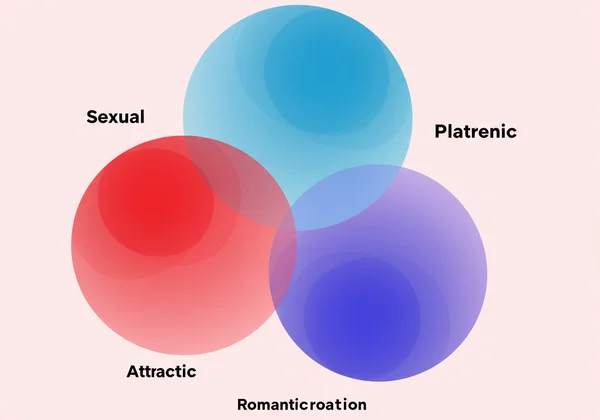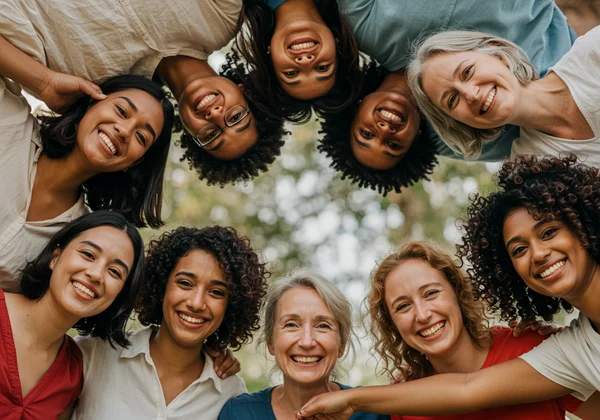الدليل الشامل: اختبار ميولك المثلية ورحلة اكتشاف الذات
هل تعانين من تساؤلات حول هويتك الجنسية؟ يمكن أن تكون عملية التساؤل عن هويتي الجنسية مربكة، ومرهقة، ومنعزلة أحيانًا. قد تتساءلين عما إذا كانت مشاعرك صحيحة أو ما تعنيه لمستقبلك. الخبر الرائع هو أنك لست وحدك، وهذه الرحلة لاكتشاف الذات هي تجربة شخصية عميقة وصحيحة. هذا الدليل هو مساحة آمنة وداعمة لمساعدتك على التنقل في رحلتك الفريدة بوضوح وتعاطف.
سيستكشف هذا الدليل المشاعر الشائعة، وأنواع الجاذبية المختلفة، وكيفية احتضان من أنت. هل من الطبيعي التساؤل عن هويتك الجنسية؟ بالتأكيد. إنها علامة على الوعي الذاتي والتأمل. إذا كنت تبحثين عن نقطة بداية لطيفة، فإن الأداة المصممة للتأمل الذاتي يمكن أن تكون مفيدة للغاية. يمكنك بدء رحلة اكتشاف ذاتك من خلال اختبار داعم متى شعرت بالاستعداد.
هل من الطبيعي التساؤل عن هويتك الجنسية؟
دعونا نوضح منذ البداية: من الطبيعي تمامًا التساؤل عن هويتك الجنسية. يمكن أن يحدث هذا الاستكشاف في أي عمر، سواء كنت مراهقة تتنقل بين مشاعر جديدة أو بالغة تعيد تقييم معتقدات راسخة. غالبًا ما يقدم المجتمع نظرة ضيقة جدًا للعلاقات والجاذبية، مما يجعل من الصعب التعرف على المشاعر التي تقع خارج هذا الصندوق المحدد أو فهمها.
التساؤل ليس علامة على كونك محطمة أو مشوشة بطريقة سلبية؛ بل هو مؤشر على أنك متناغمة مع ذاتك ومنفتحة على فهم هويتك الأصيلة. يمر العديد من الأشخاص بتحولات في مشاعرهم وجاذبيتهم طوال حياتهم. رحلتك هي ملكك وحدك، ولا يوجد جدول زمني صحيح أو خاطئ لاكتشاف الذات.

التعرف على المشاعر الشائعة وعلامات الانجذاب المبكرة نحو النساء
في بعض الأحيان، لا تكون علامات الانجذاب إلى النساء الأخريات واضحة ومباشرة كلحظة البرق. يمكن أن تكون مشاعر خفية وهادئة ربما تكونين قد تجاهلتها أو أساءت تفسيرها على مر السنين. يعد التعرف على هذه المؤشرات المبكرة جزءًا أساسيًا من فهم ذاتك.
قد تشمل المشاعر الشائعة:
- إعجاب شديد بالنساء الأخريات يختلف عن الصداقة.
- أحلام اليقظة المتكررة أو التخيلات حول سيناريوهات رومانسية أو حميمة مع النساء.
- الشعور بالاتصال العاطفي الأعمق والفهم من قبل النساء.
- شعور بالفضول أو الإثارة عند رؤية أزواج مثلية في وسائل الإعلام أو الحياة الواقعية.
- النظر إلى الوراء وإدراك أن "أفضل صداقاتك" مع الفتيات كانت تحمل مستوى من الشدة قد يكون رومانسيًا.
هذه مجرد أمثلة قليلة، وقد تكون تجربتك مختلفة تمامًا. المفتاح هو الاعتراف بهذه المشاعر دون إصدار أحكام. إذا كنت تحاولين فهم هذه المشاعر، فإن اختبار هل أنا مثلية يمكن أن يوفر طريقة منظمة للتفكير فيها.
لماذا تتساءل بعض النساء عن هويتهن في مراحل لاحقة من الحياة
من المفاهيم الخاطئة الشائعة أن الجميع يكتشفون ميولهم الجنسية في سنوات المراهقة. تبدأ العديد من النساء في التساؤل عن هويتهن في مراحل لاحقة من الحياة، غالبًا في العشرينات، الثلاثينات، أو حتى بعدها. غالبًا ما يُشار إلى هذه التجربة على أنها "مثلية متأخرة الاكتشاف"، وهي شائعة بشكل لا يصدق.
هناك العديد من الأسباب لذلك. تنشأ بعض النساء في بيئات لا تُناقش فيها الهويات غير المغايرة جنسيًا أو لا تُقبل، مما يدفعهن إلى قمع مشاعرهن الحقيقية. قد لا يكون لدى أخريات اللغة أو الفهم لتحديد جاذبيتهن في وقت مبكر. يمكن أن تكون أحداث الحياة مثل إنهاء علاقة مغايرة جنسيًا طويلة الأمد أو تطوير رابطة عميقة مع صديقة أنثى بمثابة محفزات لهذا الاكتشاف الذاتي العميق.

فهم مشاعرك: استكشاف أنواع مختلفة من الجاذبية
مصدر رئيسي للارتباك عند التساؤل حول ميولك الجنسية هو الخلط بين أنواع مختلفة من الجاذبية. للحصول على الوضوح، من المفيد فهم ما تشعرين به. الجاذبية ليست تجربة واحدة متجانسة؛ إنها طيف ذا طبقات عديدة وجميلة ومتنوعة.
يمكن أن يكون فهم هذه الاختلافات مثل إضاءة مصباح في غرفة مظلمة. يساعدك ذلك على تكريم كل مشاعرك على حقيقتها، دون إجبارها على صندوق لا يناسبها تمامًا. هذه العملية تتعلق بجمع المعلومات، مما يساعدك على فهم عالمك الداخلي حقًا.
الجاذبية الجنسية والرومانسية والأفلاطونية: ما الفرق؟
لفهم مشاعرك بشكل أفضل، يساعدك معرفة الفرق بين الأنواع الرئيسية للجاذبية. يمكن أن توجد معًا أو بشكل منفصل تمامًا.
- الجاذبية الجنسية: هي رغبة في العلاقة الحميمة الجسدية أو الاتصال الجنسي مع شخص آخر. إنها تتعلق بانجذاب جسدي وحسي تجاه شخص ما.
- الجاذبية الرومانسية: تتضمن الرغبة في علاقة رومانسية مع شخص ما. تشمل الحميمية العاطفية، والاتصال العميق، والشراكة. يمكنك أن تنجذبي رومانسيًا إلى شخص دون أن تنجذبي إليه جنسيًا، والعكس صحيح.
- الجاذبية الأفلاطونية: هي الرغبة في تكوين صداقة وثيقة مع شخص ما. إنها مبنية على اهتمامات مشتركة، وثقة، ودعم عاطفي، بدون مكون رومانسي أو جنسي. قد يكون الخط الفاصل بين المشاعر الأفلاطونية الشديدة والمشاعر الرومانسية غامضًا أحيانًا، وهي نقطة ارتباك شائعة.
يمكن أن يوفر التفكير في من تشعرين بكل نوع من أنواع الجاذبية تجاهه أدلة قوية.

هل أنا مثلية أم ثنائية الميول؟ العثور على جاذبيتك المحددة
هذا هو أحد أكثر الأسئلة شيوعًا التي يطرحها الناس أثناء اكتشافهم لذاتهم. تكمن الإجابة في نمطك الفريد من الجاذبية. المثلية هي امرأة تنجذب جنسيًا و/أو رومانسيًا بشكل حصري إلى نساء أخريات. المرأة ثنائية الميول تنجذب إلى أكثر من جنس واحد.
لا يوجد ضغط لاختيار تسمية فورًا. الهدف هو فهم مشاعرك، لا الانتماء إلى فئة محددة مسبقًا. يجد بعض الناس أن تسمية محددة تمنحهم القوة، بينما يفضل آخرون أن تظل هويتهم أكثر مرونة. إذا كنت تستكشفين هذه المشاعر، فإن اختبار الميول الجنسية المثلية السري يمكن أن يكون أداة مفيدة للتأمل الشخصي.
التصنيفات كوسائل: ماذا تعني كلمة "مثلية" لهويتك؟
يمكن أن تكون التصنيفات قوية بشكل لا يصدق. بالنسبة للكثيرين، يمكن أن يشعر العثور على التصنيف الصحيح — مثل "مثلية" — وكأنه العودة إلى الوطن. يوفر الشعور بالانتماء للمجتمع، والتحقق، وتاريخ مشترك. يمكن أن يمنحك التصنيف اللغة لوصف تجربتك لنفسك وللآخرين، مما يمكن أن يكون تمكينًا بشكل لا يصدق.
ومع ذلك، من المهم أن تتذكري أن التصنيفات أدوات، وليست أقفاصًا. يجب أن تخدمك، لا أن تحددك بطريقة مقيدة. إذا كان التصنيف يبدو صحيحًا، فاحتضنيه. وإذا لم يكن كذلك، فلديك الحرية في تحديد هويتك بطريقة تشعرين أنها الأكثر أصالة بالنسبة لك.
احتضان المرونة وطيف الهوية
الميول الجنسية ليست دائمًا ثابتة؛ بالنسبة للكثيرين، يمكن أن تكون مرنة. هذا المفهوم، المعروف باسم مرونة الهوية المثلية، يدرك أن جاذبية الشخص يمكن أن تتغير وتتطور بمرور الوقت. قد تحددين هويتك كمثلية الآن وتشعرين بشكل مختلف في المستقبل، وهذا تمامًا.
فكرة الطيف مفيدة هنا. بدلاً من رؤية الميول الجنسية كمجموعة من الصناديق الجامدة (مثلي، مغاير، ثنائي)، تخيليها كمنظر طبيعي واسع ومفتوح. قد يتغير مكانك في هذا المنظر الطبيعي مع نموك وتغيرك كشخص. السماح لنفسك بهذه النعمة هو عمل عميق من حب الذات.
المغايرة الجنسية الإلزامية (CompHet): فك توقعات المجتمع
عقبة رئيسية في رحلة اكتشاف الذات هي مفهوم يسمى المغايرة الجنسية الإلزامية (CompHet). هذا هو الافتراض المجتمعي بأن الجميع مغايرون جنسيًا ما لم يثبت العكس. إنه الضغط الخفي والعلني من المجتمع، ووسائل الإعلام، وحتى العائلة الذي يدفع النساء نحو العلاقات المغايرة جنسيًا.
يمكن أن تسبب المغايرة الجنسية الإلزامية ارتباكًا عميقًا لأنها تعلمنا تفسير مشاعرنا من خلال عدسة مغايرة جنسيًا. قد يُخطأ الإعجاب الشديد بصديقة أنثى ويُفسر على أنه غيرة، أو قد يُصاغ عدم الاهتمام بالرجال على أنه "صعب الإرضاء". يعد فك هذه الرسائل المجتمعية المتأصلة خطوة حاسمة في فهم جاذبيتك الحقيقية. يمكن أن يساعدك إجراء اختبار المثلية الجنسية على تجاوز هذه الضغوط الخارجية والتركيز حصريًا على مشاعرك الداخلية.
التنقل في رحلة ميولك الجنسية: الخطوات التالية والدعم
رحلتك الاستكشافية لا يجب أن تُسلك وحدها. بينما تمضين قدمًا، ركزي على خلق بيئة داعمة وراعية لنفسك. هذا وقت للرفق والصبر والتعاطف مع الذات.
تذكري، هذا ليس سباقًا. إنها عملية شخصية للتعرف بشكل أعمق على ذاتك الأصيلة. يجب أن تشعر الخطوات التي تتخذينها أنها مناسبة لك، وبوتيرتك الخاصة.
إعطاء الأولوية لصحتك النفسية أثناء اكتشاف الذات
يمكن أن يكون التساؤل حول هويتك تجربة عاطفية مكثفة. إعطاء الأولوية لصحتك النفسية أمر أساسي. ممارسات بسيطة يمكن أن تحدث فرقًا كبيرًا.
فكري في تدوين أفكارك ومشاعرك في دفتر يوميات دون رقابة. مارسي اليقظة الذهنية أو التأمل للبقاء متجذرة في اللحظة الحالية. والأهم من ذلك، عاملي نفسك بلطف. أنت تتعلمين وتنمين، وهذا شيء جميل.
العثور على مجتمعك وبناء نظام دعم
يمكن أن يكون التواصل مع الآخرين الذين لديهم تجارب مماثلة مغيرًا للحياة. إنه يحارب مشاعر العزلة ويوفر الشعور بالانتماء. نظام دعم قوي لا يقدر بثمن.
قد تجدين مجتمعًا في مساحات عبر الإنترنت مثل Reddit (r/actuallesbians مصدر قيّم) أو مراكز LGBTQ+ المحلية. إذا شعرت بالأمان للقيام بذلك، ففكري في الثقة في صديق أو فرد عائلة موثوق به. الهدف هو إحاطة نفسك بأشخاص يحبونك ويدعمونك كما أنتِ.

طريقك الفريد لاكتشاف الذات
الشروع في رحلة التساؤل حول ميولك الجنسية هو فعل شجاع من حب الذات. تذكري أن كل سؤال تطرحينه وكل شعور تستكشفينه هو خطوة نحو عيش حياة أكثر أصالة. طريقك فريد لك، ولا توجد طريقة صحيحة أو خاطئة لسلوكه.
كوني صبورة، عاملي نفسك بلطف، وثقي بمشاعرك. أنتِ السلطة المطلقة على هويتك الخاصة. إذا كنت مستعدة لاتخاذ خطوة لطيفة، خاصة، وداعمة إلى الأمام، ندعوكِ لإجراء اختبار ميولك المثلية المجاني. إنه مصمم لمساعدتك على التأمل في مشاعرك في مساحة آمنة واكتساب المزيد من الوضوح في رحلتك.
الأسئلة المتكررة حول التساؤل عن ميولك الجنسية
كيف أعرف ما إذا كنت أحب الفتيات؟
يمكن أن يظهر الإعجاب بالفتيات بطرق عديدة. قد تكون فكرة مستمرة، أو ارتباطًا عاطفيًا عميقًا تشعرين به بشكل أساسي مع النساء، أو انجذابًا جسديًا تلاحظينه عند رؤية نساء أخريات. انتبهي لأحلام اليقظة، ومن تنجذبين إليه في وسائل الإعلام، ومن تجعلك صحبتهم تشعرين بالحياة والفهم أكثر.
ما هي العلامات الرئيسية لكونك مثلية؟
لا توجد قائمة تحقق واحدة، ولكن العلامات الشائعة تشمل الانجذاب العاطفي و/أو الرومانسي و/أو الجنسي بشكل حصري إلى النساء. قد تجدين أن أعمق علاقاتك وأكثرها إرضاءً كانت مع النساء، أو قد تشعرين بغياب كامل للجاذبية الحقيقية تجاه الرجال. يمكن أن تساعدك أدوات مثل اختبار المثلية الخاص بنا على استكشاف هذه المشاعر بعمق أكبر.
هل من الطبيعي التساؤل عن ميولك الجنسية في أي عمر؟
نعم، إنه طبيعي تمامًا. لا يوجد حد عمري لاكتشاف الذات. يتساءل العديد من الأشخاص عن ميولهم الجنسية في سنوات المراهقة، بينما يفعل آخرون ذلك في الثلاثينات، أو الخمسينات، أو حتى لاحقًا. يمكن أن تؤدي تجارب الحياة، وزيادة الوعي الذاتي، وتغير المشهد الاجتماعي إلى فهم جديد للذات في أي مرحلة من مراحل الحياة.
ماذا يعني أن تكوني مثلية اليوم؟
كونك مثلية اليوم يعني أن تكوني جزءًا من مجتمع متنوع ونابض بالحياة. إنه يعني تحديد الهوية كامرأة تنجذب إلى نساء أخريات. إنها هوية ذات تاريخ غني بالمرونة والحب والفخر. في النهاية، ما يعنيه أن تكوني مثلية هو أمر يحدده كل فرد بنفسه.